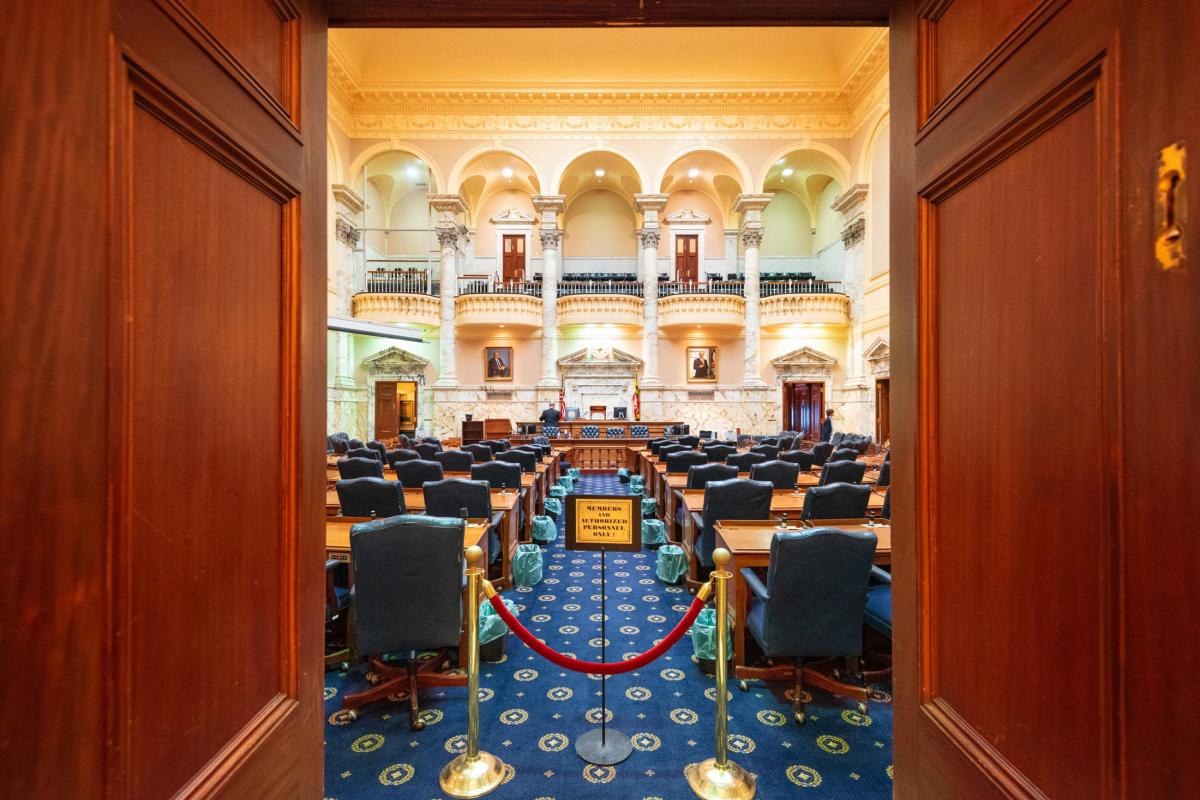
Lawmakers heading back to Annapolis next week for the start of the 2022 legislative session will be walking into a more politically pressurized stage than in most years. On top of the policy battles playing out in back rooms and on the State House floor, there’s the spotlight that comes with the late June primaries and a particularly decisive November approaching.
“We’ve got an election coming around,” notes Todd Eberly, an associate professor of political science at St. Mary’s College of Maryland. “I think that’s going to be front and center on a lot of folks’ minds.”
In this final year of Maryland’s four-year electoral cycle, political scientists and lawmakers expect a more fiery session than usual. Legislators from both parties will be making their best case for reelection (or for a favorite heir,) be it on the State House floor or out on the campaign trail ahead of the June 28 primaries.
Democrats, already holding overpowering majorities in the House of Delegates and Senate, will still look to boost their party’s signal in heavily blue Maryland, while Republicans work to make the most of their State House platform and sway centrist voters in their direction. The greater political stakes haven’t been this high in years, with Republican Gov. Larry Hogan serving out his final year in office and the post of longtime Comptroller Peter Franchot—himself vying for the governor’s seat as a Democrat—up for grabs for the first time since 2006.
“This is a session that sets up the 2022 cycle,” says Mileah Kromer, director of the Sarah T. Hughes Center for Politics at Goucher College.
It’s against this political backdrop that legislators will debate the General Assembly’s collective top priorities for 2022, from cannabis legalization, criminal justice reform, and climate change policy to deciding the very boundaries that determine political representation for constituents across the state. Here’s a rundown of a handful of the most pressing matters:
Drawing Lines
An existential matter of sorts, senators and delegates will have the first 45 days of the session to approve a new legislative redistricting plan, or otherwise allow a plan from the outgoing Republican governor to take effect. (This concerns statewide electoral districts and is separate from the hotly debated Congressional map approved during a December special session.) Maryland regularly redraws these lines after each decennial census.
Under a proposed map unveiled by an appointed state advisory commission in late December, Baltimore would lose one of its existing five senatorial districts. Elsewhere, the map would favor Democrats in more politically vulnerable areas like rural Howard County and Frederick, as noted by Maryland Matters.
Multiple Baltimore lawmakers noted in interviews that they plan to fight against the erasure of one of the city’s five districts on the map. However, they acknowledged the challenges of doing so as Baltimore continues to bleed population even as the region grows.
“Redistricting has to be the main focus,” says Sen. Cory McCray (D-Baltimore,) who chairs Baltimore’s senate delegation. “We have to make sure that some form of good representation is still left for the city.”
Seeds Sprouting
While Maryland continues to lag regional peers like Virginia and the District of Columbia in legalizing cannabis for adult use, the state appears poised to finally join the club of 18 others (plus D.C.) that have fully legalized the plant.
What that will look like, exactly, is unclear, however. House Speaker Adrienne Jones convened a legalization workgroup this fall to discuss the implications of legalization, and has publicly supported putting the issue up to voters as a referendum in the November general election. On her behalf, workgroup chair Del. Luke Clippinger (D-Baltimore,) has pre-filed a two-page bill that, if approved by both houses, would put the question, “Do you favor the legalization of adult–use cannabis in the State of Maryland?” on the ballot. Specifics, from industry framework to social equity components, would be decided later on.
But other leaders and advocates would like to see lawmakers set a framework for legalization this session, instead of punting on the specifics. Top of mind are concerns about longstanding racial imbalances—from years of racially discriminatory policing of cannabis to a general lack of minority participation in Maryland’s medical cannabis green rush. At least one legislator, Sen. Jill Carter (D-Baltimore,) is filing a companion bill that lays out the details for regulating the forthcoming industry and tackling criminal justice reforms—including directing a share of revenues to communities harmed by the war on drugs and vacating prior charges and convictions for possession.
“It’s the first real opportunity we’ve had where we’re legalizing something that was previously illegal that has had a drastic impact on Black people,” Carter says. “The issue is will the legislature be honest and practical about righting those wrongs? About creating opportunities for Black people that have been criminalized?”
Fixing Policing
Last session was a meaningful one for criminal justice reform advocates, thanks to the General Assembly’s passage (and subsequent overrides of Hogan’s vetoes) of a package of police reform measures. Among the resulting changes were new laws expanding public access to previously confidential officer misconduct records (known as Anton’s Law), setting new limits on no-knock search warrants, increasing standards and penalties for use of force, and overhauling the complaint-review and disciplinary process for officers.
But there’s work yet unfinished, lawmakers say. Del. Robbyn Lewis (D-Baltimore) hopes she and her General Assembly colleagues can do away with qualified immunity, which currently protects officers from civil lawsuits if they physically or emotionally harm others while on duty. “That was just something that did not get done in police reform last year,” Lewis says. “I personally hope we address it.”
Carter plans to also file bills to halt the practice of automatically charging minors as adults for certain crimes and require that juvenile offenders receive counsel before being interrogated, among other issues.
Fighting Climate Change
Last year lawmakers failed to resolve their differences over a comprehensive package of new climate change-righting regulations, dubbed the Climate Solutions Now Act, before the session ended in April. Leaders hope to resurrect the charge this year—reportedly either as another package in the Senate, or via piecemeal legislation in the House—by ultimately setting higher goals for cutting greenhouse gas emissions (last updated in 2016,) increasing standards for green buildings, boosting electric vehicle infrastructure statewide, setting new tree-planting requirements, and more.
Lewis nodded to an “enormous dramatic conflict” that doomed the package’s fate in the late hours of the 2021 session, but said she foresees an increased “willingness to move on climate” this session.
COVID Matters
The monster in the room isn’t going away: the two-year anniversary of the COVID-19 pandemic is approaching in March, when lawmakers will still be in session. Maryland is now back under a state of emergency as the Omicron variant wreaks havoc on households and hospitals. Expect COVID to continue making its presence known this session, with many committee hearings happening virtually, lawmakers remaining behind partitions during floor votes, and anyone in the State House (or any state buildings) required to wear a mask under the governor’s latest executive order.
More broadly, members will be tasked with addressing Maryland’s underprepared health care system, which is currently suffering from worker shortages everywhere from nursing homes to hospitals. The goal, Lewis says, should be “increasing the pipeline, making it easier for people to pursue training, and get jobs in health care.”
Money Talks
The General Assembly will tackle its annual duty of passing a budget for the state’s next fiscal year, which, this time around, means deciding what to do with a historically large $6 billion surplus, attributable in large part to federal stimulus spending. Hogan and Democrats are already sparring over that question. The term-limited governor would like to use that money to bolster the state’s rainy day fund and pay for tax cuts for retirees and working families, while Democrats like Franchot have called for spending much of it to help households continuing to struggle through the pandemic.
“There are going to be a lot of competing interests looking for a chunk of that money,” notes Eberly.
